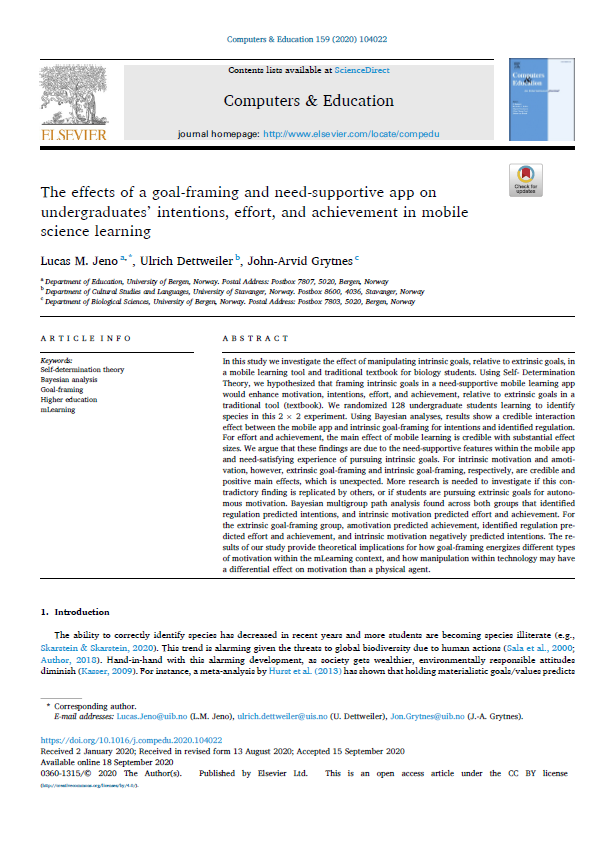Lucas M. Jeno (Department of Education, University of Bergen and bioCEED), Ulrich Dettweiler (Department of Cultural Studies and Languages, University of Stavanger) and John-Arvid Grytnes (Department of Biological Sciences, University of Bergen) have recently published the paper “The effects of a goal-framing and need-supportive app on undergraduates’ intentions, effort, and achievement in mobile science learning” in Computers & Education.
In this study we investigate the effect of manipulating intrinsic goals, relative to extrinsic goals, in a mobile learning tool and traditional textbook for biology students. Using Self- Determination Theory, we hypothesized that framing intrinsic goals in a need-supportive mobile learning app would enhance motivation, intentions, effort, and achievement, relative to extrinsic goals in a traditional tool (textbook). We randomized 128 undergraduate students learning to identify species in this 2 × 2 experiment. Using Bayesian analyses, results show a credible interaction effect between the mobile app and intrinsic goal-framing for intentions and identified regulation. For effort and achievement, the main effect of mobile learning is credible with substantial effect sizes. We argue that these findings are due to the need-supportive features within the mobile app and need-satisfying experience of pursuing intrinsic goals. For intrinsic motivation and amotivation, however, extrinsic goal-framing and intrinsic goal-framing, respectively, are credible and positive main effects, which is unexpected. More research is needed to investigate if this contradictory finding is replicated by others, or if students are pursuing extrinsic goals for autonomous motivation. Bayesian multigroup path analysis found across both groups that identified regulation predicted intentions, and intrinsic motivation predicted effort and achievement. For the extrinsic goal-framing group, amotivation predicted achievement, identified regulation predicted effort and achievement, and intrinsic motivation negatively predicted intentions. The results of our study provide theoretical implications for how goal-framing energizes different types of motivation within the mLearning context, and how manipulation within technology may have a differential effect on motivation than a physical agent.
Keywords: Self-Determination Theory, Bayesian analysis, Goal-framing, Higher education, mLearning.
Reference and link to the article
Jeno, L. M., Dettweiler, U. and Grytnes, J.-A. (2020). The effects of a goal-framing and need-supportive app on undergraduates’ intentions, effort, and achievement in mobile science learning. Computers & Education 159 (2020) 104022
About the author

